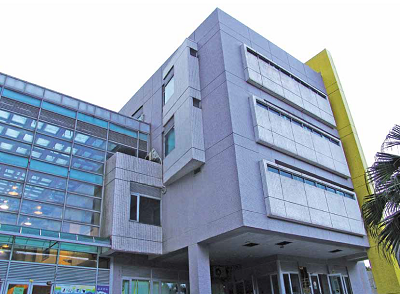 The Institute of Optoelectronic Sciences in the National Taiwan Ocean University was established in 1997. At Present, the institute provides MS study, including the Industrial R&D Master Program, and PhD study, and it thrives energetically.
The Institute of Optoelectronic Sciences in the National Taiwan Ocean University was established in 1997. At Present, the institute provides MS study, including the Industrial R&D Master Program, and PhD study, and it thrives energetically.
Goal
The objective of the institute is to cultivate advanced optoelectronic talents for the country and industries, strengthen optoelectronic research, and aid relevant marine science with necessary optoelectronic technology.
Development
Currently, the institute aims at nano-optoelectronic applications and integrates with three research focuses, respectively biomedical optoelectronics, display technology, and new cutting-edge technology.
The research directions include
- surface plasmon resonance theory, experiment and its applications to bio-photonics.
- Raman scattering and the optoelectronic properties of low dimensional semiconductors
- near field optics and scanning microscopy
- physics of magneto-optics and technology of data storage
- the light-emitting principles of organic materials
- near field optics
- the optoelectronic properties of InN, GaN and related light-emitting materials
- quantum optics
- theory of electromagnetically induced transparency
- he theory of relativistic nonlinear optics
- the processing of nano photonics
- ultrafast optics
- flat panel display
- optical fiber communications.
In the future, the institute will hire more teachers with specialties in optoelectronics to further enhance diversified studies. Moreover, the institute will also actively cooperate with the Academia Sinica, the Chung-Shan Institute of Science and Technology, and domestic and international universities to develop the research fields.
Curriculum Features
Some of the postgraduate students in the institute have an electronic or electrical background while some of them have a physical background. In addition, the students accepted by the institute are less then ten almost every year. Therefore, the accepted students all actively seize the opportunity for learning, and while studying and doing research, they fully help and encourage each other. This forms an excellent learning atmosphere. Furthermore, the student-teacher ratio is less than 7 in the institute, and full-time teachers are encouraged to try their best to provide professional courses, so small-class teaching is applied to most of the classes to achieve optimal learning. In addition to professional courses for different fields, the institute provides the “Advanced Optoelectronic Experiment Project” course, and each laboratory provides research resources for postgraduate students from different laboratories to have chances to understand the research in other laboratories in order to provide them interdisciplinary training and further expand their research vision.
- The PhD study period: 2~7 years
- The PhD graduate credits: 22 (compulsory courses: 4; elective courses: 18)
- The Master study period: 1~4 years
- The Master graduate credits: 30 (compulsory courses: 10; elective courses: 20)
Faculty
| Professor & Director | Chang, Railing | Ph. D., Physics, the University of Arizona, U.S.A. | Spectroscopy, Near Field Optics |
| Professor | Yang, Jyh-Shinn | Ph. D., Physics, National Taiwan University | Micromagnetics, Physics of Magnetic Recording, Magnetooptical Physics |
| Professor | Chou, Hsiang-Shun | Ph. D., Physics, National Taiwan University | Theoretical Atomic Physics |
| Professor | Chiang, Hai-Pang | Ph. D., Electrical Engineering, National Taiwan University | Nano-optoelectronic, Laser Spectroscopy, Applied Optics |
| Professor | Lin, Tai-Yuan | Ph. D., Physics, National Taiwan University | Experimental Semiconductor Physics, Light-emitting Components, Photovoltaics |
| Professor | Hwang, Jih-Shang | Ph. D., Physics, National Cheng Kung University | Nano-optoelectronic Materials and Processes, Semiconductor Manufacturing Process, Solar Cell |
| Associate Professor | Wu, Hsi-Shu | Ph. D., Physics, University of Missouri, U.S.A. | Plasma Physics, Optics |
| Associate Professor | Wu, Yeun-Jung | Ph. D., Physics, Rensselaer Polytechnic Institute, U.S.A | Semiconductor Physics, Spectroscopy |
| Associate Professor | Tsai, Tsong-Ru | Ph.D., Physics, National Tsing Hua University | Ultrafast Optoelectronics, Condense Matter Physics, MHz Radiation, Biological and Biomedical Imaging |
| Associate Professor | Hung, Wen-Yi | Ph. D., Electro-Optical Engineering, National Taiwan University | Organic Optoelectronic Semiconductors and Components, Flat Panel Display |
| Assistant Professor | Lo, Chia-Yao | Ph. D., Electro-Optical Engineering, National Sun Yat-sen University | Crystal Growth, Laser Technology, Optical Fiber Communication |
Teaching Resources
Research/Teaching Laboratories and Important Research Instruments
Research/Teaching Laboratories
Surface Plasmon Resonance Measurement System, Micro Raman Spectrometer, Multi-functional Atomic Force Microscope, Near-field Optical Microscope, Liquid Scanning Atomic Force Microscope, Photoluminescence Measurement System, Absorbance/penetration/reflection Spectrometer, Ultrafast Laser, Time-Resolved Spectroscopic Measurement System, MHz Radiation Measurement System, Organic Time-of-flight Conduction Properties Measurement System, Crystal-fiber Production System, Plasma Sputtering System, Metal Deposition System, Organic Material Deposition System, Organic Material Purification System, Optoelectronic Semiconductor Nano Manufacturing System, Field Emission Measurement System, Rapid Heat Treatment Furnace, Multi-wavelength Laser, Spectrometer
Applied Optics Laboratory
Laser Spectroscopy Laboratory
Optoelectronic Semiconductor Laboratory
Ultrafast Optoelectronic Laboratory
Nanofabrication and Thin Film Processing Laboratory
Organic Optoelectronic Laboratory
Crystal-fiber Components Laboratory
Micromagnetic Computation Room
Electro-optic Physics Thematic Laboratory
Infinite Future
If the postgraduates from the institute choose to pursue further study, they may apply for domestic or international PhD programs in different fields. At present, numerous postgraduates are already doing their PhD study in various universities. If the postgraduates choose to obtain employment, they are also extremely competitive. Currently, industries demand for optoelectronic talents eagerly, so most of the postgraduates will have multiple choices in terms of employment. Although the institute was established in 1997, numerous postgraduates from the institute have already become senior managers. The employers include not only governmental organizations but also various industries, such as companies for semiconductors, light-emitting components, flat panel displays, photovoltaics, bio-optoelectronics, communication components, optoelectronic automation, and nanotechnology.